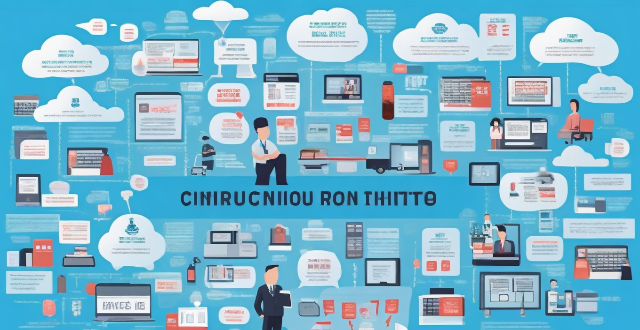Policies Government

How do government policies influence the growth of electric vehicle infrastructure ?
Government policies play a crucial role in shaping the growth of electric vehicle (EV) infrastructure. These policies can be broadly categorized into regulatory, financial, and informational measures. Regulatory policies set standards and mandates that must be followed by businesses and consumers, while financial incentives and disincentives are powerful tools used by governments to encourage the adoption and expansion of EV infrastructure. Information plays a vital role in shaping consumer behavior and market dynamics, with governments leveraging this by providing relevant data and promoting awareness. In conclusion, government policies across regulatory, financial, and informational domains have a profound impact on the growth of electric vehicle infrastructure.

How do government policies and regulations impact climate change mitigation efforts ?
Government policies and regulations are crucial in guiding societies towards sustainable practices that mitigate climate change. These frameworks influence climate change mitigation efforts through legislation, financial incentives, public awareness campaigns, international agreements, regulatory measures, economic instruments, research and development, public engagement and education, and international collaboration. By implementing these strategies, governments can drive meaningful change and secure a sustainable future for all.

What is the role of government policies in promoting the adoption of clean production technologies ?
Government policies are crucial in promoting clean production technologies by providing regulatory frameworks, fiscal incentives, information and education, funding for research and development, and international cooperation. These policies create an enabling environment for businesses to adopt cleaner technologies, leading to a more sustainable future.

What role does government play in promoting green technology ?
The government plays a crucial role in promoting green technology. This is because the government has the power to create policies and regulations that can encourage the adoption of sustainable practices and technologies. Here are some ways in which the government can promote green technology: 1. Funding and Incentives 2. Regulations and Standards 3. Public Awareness Campaigns 4. Collaboration with Industry

What is the role of national governments in implementing climate change policies ?
The role of national governments in implementing climate change policies is crucial. They are responsible for developing and enforcing laws, regulations, and policies that address the causes and consequences of climate change. This involves a wide range of actions, from reducing greenhouse gas emissions to adapting to the impacts of climate change. National governments have several key responsibilities when it comes to climate change, including legislation and regulation, international cooperation, funding and support for sustainable development, public awareness and education, and encouraging private sector involvement. Examples of national government actions on climate change include setting renewable energy targets, implementing carbon pricing mechanisms, participating in international climate agreements, and taking adaptation measures.

What role does government regulation play in improving air quality ?
Government regulation plays a crucial role in improving air quality by implementing policies and standards that reduce emissions from various sources. These regulations are designed to protect public health, preserve the environment, and promote sustainable development. The different ways government regulation contributes to improving air quality include setting emission standards, enforcing compliance with regulations, promoting clean energy sources, supporting research and development, and educating the public. By engaging with citizens and fostering a culture of environmental responsibility, governments can encourage behavior change that leads to improved air quality.

How can citizens influence government policies related to climate change ?
Citizens can significantly influence government policies on climate change through various means like voting for pro-climate candidates, public advocacy, education, community actions, making sustainable consumer choices, collaboration, legal measures, digital engagement, research funding, financial decisions, educational integration, corporate responsibility, and international cooperation.

Can environmental subsidy policies help reduce carbon emissions ?
Environmental subsidy policies can help reduce carbon emissions by promoting renewable energy, enhancing energy efficiency, supporting waste reduction initiatives, and funding research and development of carbon capture and storage technologies. However, these policies must be carefully designed and adequately funded to avoid market distortions and ensure long-term sustainability without creating dependence on government support.

Can carbon offsetting be used as a substitute for government action on climate change ?
The article discusses the concept of carbon offsetting and its potential as a substitute for government action on climate change. Carbon offsetting involves investing in projects that reduce or remove greenhouse gases from the atmosphere, such as renewable energy sources and reforestation. While it has advantages like individual responsibility and immediate impact, it also has limitations like not being a complete solution and lack of regulation. Government action is crucial in addressing climate change through regulation, infrastructure, and education. The conclusion states that carbon offsetting can be a useful tool, but it cannot replace government action.

What role do international organizations play in promoting environmental subsidy policies ?
International organizations play a crucial role in promoting environmental subsidy policies by providing information, facilitating cooperation, offering financial support, setting standards, and engaging in advocacy efforts.

What is the impact of Brexit on UK immigration policies ?
Brexit has had a significant impact on UK immigration policies, including the end of free movement for EU citizens, the introduction of a points-based immigration system, a settled status scheme for EU citizens, changes in student visa policies, and increased scrutiny of immigration applications. These changes reflect the UK government's desire to regain control over its borders and shape its immigration policies according to national interests.

How does government budgeting differ from corporate budgeting ?
Government budgeting and corporate budgeting differ in purpose, constraints, methodologies, and time horizons. Government budgeting aims to allocate resources for public services and maintain economic stability, while corporate budgeting focuses on profit maximization and risk management. Government budgets require legislative approval and face public scrutiny, while corporate budgets are influenced by market forces and shareholder pressure. Methodologies used in government budgeting include zero-based budgeting and performance budgeting, while corporations use static budgeting and activity-based budgeting. Government budgeting often has a multi-year perspective, while corporate budgeting typically follows an annual cycle.

Are there any drawbacks to implementing environmental subsidy policies ?
This text discusses the potential drawbacks of environmental subsidy policies, including increased costs for consumers, market distortion, administrative challenges, overreliance on subsidies, and unintended negative environmental impacts. It emphasizes the importance of careful consideration and effective strategies to maximize benefits while minimizing drawbacks.

How do climate change negotiations influence national environmental policies ?
The influence of climate change negotiations on national environmental policies is significant, as they set international targets and promote technology transfer, financial support mechanisms, adaptation measures, stronger legal frameworks, and public awareness. These discussions help countries develop comprehensive policies that integrate climate considerations across various sectors, ensuring policy coherence and effective action towards global climate goals.

What impact do inclusive policies have on minority groups and marginalized communities ?
Inclusive policies have a significant impact on minority groups and marginalized communities, promoting equality, diversity, and fairness in society. These policies improve access to education and employment opportunities, increase representation in government and decision-making processes, reduce discrimination and harassment, and improve health outcomes for these communities. Overall, inclusive policies help ensure that all individuals have equal opportunities to participate in all aspects of life.

What is the role of government in setting building energy efficiency standards ?
The role of government in setting building energy efficiency standards is crucial for promoting sustainable development, reducing energy costs, improving public health, driving innovation and technology advancements, and creating job opportunities. By working together with industry stakeholders and the public, governments can help shape a more sustainable future for all.

How do renewable energy policies vary across different countries and regions ?
Renewable energy policies globally are shaped by economic, environmental, and political factors. Europe leads in renewable adoption with Germany's Energiewende, Spain's feed-in tariffs (FiTs), and Denmark aiming for fossil fuel independence. North America uses state-level RPS, tax incentives, and market-driven approaches. Asia sees rapid growth with China's government support and India's ambitious targets. Africa focuses on access to electricity through projects like South Africa's REIPPPP. Latin America balances economic development and sustainability, with Brazil expanding into solar and Mexico deregulating its electricity market. Policies include FiTs, quota systems, auctions, and financial incentives, varying by region's resources and priorities.

What are some common challenges faced during the implementation of climate policies, and how can they be addressed ?
Implementing climate policies faces challenges in political will, economic concerns, social acceptance, and technical limitations. Addressing these requires stakeholder engagement, policy coherence, innovation, and international cooperation.

How do renewable energy policies influence innovation and technology development ?
Renewable energy policies are crucial for driving innovation and technology development in the clean energy sector. These policies provide incentives for research, investment, and deployment, creating a favorable environment for technological advancements and innovation. Government support and funding, regulatory frameworks, market incentives, and collaboration and partnerships are all essential factors that influence innovation and technology development in this sector. By providing financial assistance, setting standards and requirements, creating demand for clean energy solutions, and fostering collaboration between different stakeholders, renewable energy policies help to accelerate the development of new technologies and improve existing ones. As we continue to face challenges related to climate change and energy security, it is essential that we continue to invest in renewable energy solutions and support policies that encourage innovation and progress in this field.

What role do governments play in implementing climate policies ?
Governments play a pivotal role in implementing climate policies by setting regulations, offering financial incentives, raising public awareness, cooperating internationally, and planning infrastructure to combat climate change.

What are the benefits of implementing energy conservation and emission reduction policies in businesses ?
Implementing energy conservation and emission reduction policies in businesses can bring numerous benefits. These benefits include environmental protection, cost savings, increased efficiency, competitive advantage, government incentives, investor appeal, improved public image, job creation, and positive community impact. By adopting these policies, businesses can contribute to a more sustainable future while also enhancing their own success and growth potential.

What are the latest immigration policies in the United States ?
The latest immigration policies in the United States have been evolving and changing rapidly. Key updates include the public charge rule, asylum policy changes, DACA renewal fees, visa restrictions for pregnant women, travel ban expansion, and migrant children at the border. These policies reflect a trend towards stricter enforcement and restrictions on both legal and illegal immigration. Advocates argue that these policies harm vulnerable populations and undermine America's historical reputation as a nation of immigrants.

What policies have been successful in promoting economic recovery in the past ?
Economic recovery refers to the process of restoring a nation's economy to its pre-recession level or even improving it. Various policies have been implemented in the past to promote economic recovery, and some of them have proven successful. Fiscal stimulus involves increasing government spending or reducing taxes to boost economic activity. Monetary policy involves adjusting interest rates and money supply to influence inflation, unemployment, and economic growth. Structural reforms involve changing the way an economy operates to improve its efficiency and competitiveness. In conclusion, various policies have been successful in promoting economic recovery in the past.

What are some successful examples of circular economy policies ?
The circular economy is a sustainable economic model that aims to minimize waste and pollution by keeping resources in use for as long as possible. Successful examples of circular economy policies include the European Union's Circular Economy Package, Netherlands' National Circular Economy Programme, China's Circular Economy Promotion Law, Japan's Sound Material-Cycle Society Act, and state-level initiatives in the United States. These policies focus on waste reduction, resource efficiency, extended producer responsibility, product stewardship, and public-private partnerships to promote a more sustainable future.

How can circular economy policies contribute to economic growth ?
Circular economy policies can drive economic growth through innovation, job creation, and sustainable business models. By promoting resource efficiency, new markets, and sustainable supply chains, these policies reduce waste management costs and enhance corporate image. Government incentives further support businesses in adopting circular practices, mitigating risks from resource shortages and commodity volatility. Ultimately, the circular economy contributes to long-term economic stability by fostering renewable resource use and reducing waste.

What challenges do countries face in implementing circular economy policies ?
Implementing circular economy policies is a complex process that countries face numerous challenges. These include lack of awareness and understanding, economic and industrial structure, legal and regulatory framework, market conditions and business practices, as well as social and cultural factors. Addressing these challenges is crucial for the successful implementation of circular economy policies, which can bring significant environmental and socioeconomic benefits.

What policies and regulations are currently in place to encourage more sustainable supply chain practices ?
Policies and Regulations Encouraging Sustainable Supply Chain Practices discusses various government initiatives, industry standards, and international agreements that promote sustainable supply chain practices. Government policies such as green procurement, carbon pricing, and eco-labels incentivize businesses to adopt environmentally friendly operations. Industry standards like CSR and LCA help companies understand and reduce their ecological footprint. International treaties like the Paris Agreement and Basel Convention provide a global framework for sustainable practices. Together, these measures form a comprehensive system to support sustainable supply chains worldwide.

How can we ensure that climate policies are fair and just for all people, regardless of income or social status ?
Climate change is a global issue that affects everyone, regardless of income or social status. However, the impacts of climate change often disproportionately affect low-income and marginalized communities. Therefore, it is essential to ensure that climate policies are fair and just for all people. Here are some ways to achieve this: 1. Prioritize vulnerable communities by identifying them, developing targeted policies, and ensuring equitable distribution of benefits. 2. Promote participatory decision-making by engaging stakeholders, providing access to information, and facilitating public participation. 3. Consider economic impacts by assessing implications, implementing transitional support, and promoting green jobs. 4. Address environmental justice by addressing historical inequities, promoting diversity and inclusion, and monitoring compliance with environmental laws. 5. Foster collaboration between government agencies by coordinating efforts, sharing resources, and evaluating progress regularly.

How can governments fund economic stimulus plans effectively ?
Governments can fund economic stimulus plans through increased government spending, tax cuts, issuing bonds, monetary policy measures, privatizing assets, international aid and loans, and budget reallocation.